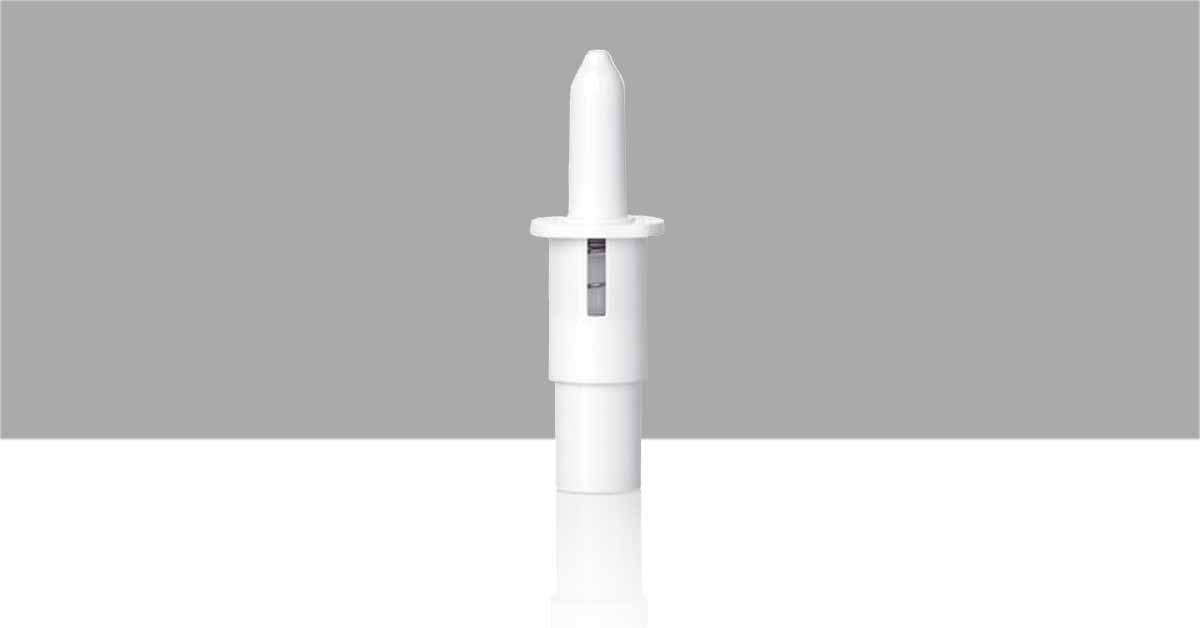Bryn’s Epinephrine Nasal Spray has Two Doses in One Portable Device
Raleigh, NC – October 21, 2019 – Bryn Pharma, LLC (“Bryn” or the “Company”), a privately held pharmaceutical company dedicated to finding a better way for patients and caregivers to treat anaphylaxis, today announced that it has entered into an agreement with Aptar Pharma (AptarGroup NYSE: ATR), a leading drug delivery systems provider, for the supply and worldwide exclusive right to use Aptar’s novel, FDA-approved Bidose (BDS) nasal device for the delivery of epinephrine to treat anaphylaxis.
Up to 30 percent of patients who develop anaphylaxis will require a second dose of epinephrine to control symptoms. Current practice parameters recommend that physicians prescribe two epinephrine auto-injectors to be carried by their patients at all times.
This month, Bryn completed dosing in its pivotal clinical trial of its Epinephrine Nasal Spray (BRYN-NDS1C), using a single, portable, optimized Aptar BDS device capable of delivering two therapeutic doses of epinephrine, replacing the need to carry two epinephrine auto-injectors.
“Studies have shown that the majority of people at risk for anaphylaxis do not carry two epinephrine auto-injectors with them at all times, putting them at greater risk of severe complications during an allergic reaction,” said David Dworaczyk, Ph.D., CEO of Bryn Pharma. “We are excited to partner with Aptar Pharma to develop a product that can provide patients with a life-saving treatment that fits in a pocket, is easy to use and complies with practice parameters.”
About Anaphylaxis
Anaphylaxis is a serious, life-threatening allergic reaction. The most common anaphylactic reactions are to foods, insect stings, medication and latex.1 A major difference between anaphylaxis and other allergic reactions is that anaphylaxis typically involves more than one system of the body.2 Anaphylaxis requires immediate medical treatment, driving approximately 100,000 emergency room visits in the U.S. each year.1,3 Because 30 percent of patients who develop anaphylaxis will require a second dose of epinephrine to control symptoms, practice parameters recommend that physicians provide patients with two auto-injectors.4 If not treated properly, anaphylaxis can be fatal.2
About Bryn Pharma
Bryn Pharma, founded in 2016, is a privately held pharmaceutical company founded by patients for patients. Bryn is focused on positively disrupting the existing market for epinephrine auto-injectors by delivering an accessible, easy-to-use alternative that better meets the needs of patients. Up to 49 million Americans may have food allergies and suffer anaphylaxis, and that number is increasing annually. Bryn Pharma seeks to provide this growing patient population with A Better Way to be prepared for a life-threatening allergic reaction. BRYN-NDS1C is not currently approved for sale by the FDA or any international regulatory authority. For more information visit www.brynpharma.com.
About Aptar Pharma
Aptar Pharma is part of AptarGroup, Inc., a leading global supplier of a broad range of innovative dispensing, sealing and active packaging solutions for the beauty, personal care, home care, prescription drug, consumer health care, injectables, food and beverage markets. Aptar uses insights, design, engineering and science to create innovative packaging technologies that build brand value for its customers, and, in turn, make a meaningful difference in the lives, looks, health and homes of people around the world. Aptar is headquartered in Crystal Lake, Illinois and has over 14,000 dedicated employees in 18 different countries. For more information, visit www.aptar.com/pharma.
# # #
Forward Looking Statements
Statements made in this press release that look forward in time or that express beliefs, expectations or hopes regarding future occurrences or anticipated outcomes or benefits are forward-looking statements. A number of risks and uncertainties, such as risks related to product development and commercialization efforts, results of clinical trials, ultimate clinical outcomes and benefit of the Company’s products to patients, market and physician acceptance of the Company’s products, intellectual property protection and competitive product offerings, could cause actual events to differ from the expectations indicated in these forward-looking statements. You are cautioned not to put any undue reliance on any forward-looking statement. This press release is neither an offer to sell nor a solicitation of an offer to purchase any particular securities. Any such offer or solicitation will be made only pursuant to definitive legal agreements prepared specifically for such purpose. An investment in the Company’s securities entails significant risks and is suitable only for sophisticated investors who can afford a loss of their entire investment; no assurance can be given that investment objectives will be achieved. In considering the performance information contained herein, you should bear in mind that past performance is not necessarily indicative of future results; there can be no assurance that the Company will achieve comparable results or that any projected returns will be met. The Company does not assume any obligation to publicly update or revise any forward-looking statements, whether as a result of new information, future events, or otherwise.
- American Academy of Allergy, Asthma & Immunology. Available at https://www.aaaai.org/conditions-and-treatments/allergies/anaphylaxis. Accessed on June 19, 2019.
- American Academy of Allergy, Asthma & Immunology. Available at: https://www.aaaai.org/conditions-and-treatments/conditions-dictionary/anaphylaxis. Accessed on June 19, 2019.
- Fromer L. Prevention of Anaphylaxis: The Role of the Epinephrine Auto-Injector. Am J Med. 2016 Dec; 129(12): 1244-1250.
- Anaphylaxis – a practice parameter update 2015; Lieberman, Phillip et al.; Annals of Allergy, Asthma & Immunology, Volume 115, Issue 5, 341-384.
Spokin Podcast Sparks Concern About Data: Theirs and Yours





